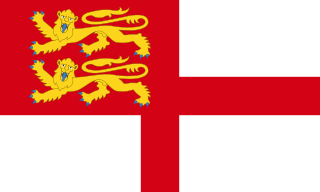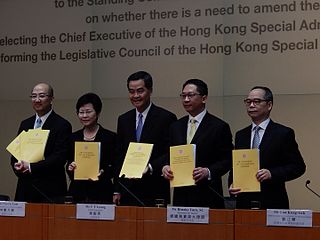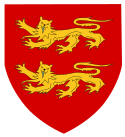
The politics of Kyrgyzstan, officially known as the Kyrgyz Republic, takes place in the framework of a presidential system representative democratic republic, whereby the President is head of state and the Chairman of the Cabinet of Ministers is head of government. Executive power is exercised by the government. Legislative power is vested in both the government and parliament. The Economist Intelligence Unit rated Kyrgyzstan an "authoritarian regime" in 2022.

Liechtenstein is a principality governed under a constitutional monarchy. It has a form of mixed constitution in which political power is shared by the monarch and a democratically elected parliament. There is a two-party system and a form of representative democracy in which the prime minister and head of government is responsible to parliament. However the Prince of Liechtenstein is head of state and exercises considerable political powers.

Sark is a part of the Channel Islands in the southwestern English Channel, off the coast of Normandy, France. It is a royal fief, which forms part of the Bailiwick of Guernsey, with its own set of laws based on Norman law and its own parliament. It has a population of about 500. Sark has an area of 2.10 square miles (5.44 km2). Little Sark is a peninsula joined by a natural but high and very narrow isthmus to the rest of Sark Island.

The Seigneur of Sark is the head of Sark in the Channel Islands. "Seigneur" is the French word for "lord", and a female head of Sark is called Dame of Sark, of which there have been three. The husband of a female ruler of Sark is not a consort but is jure uxoris a seigneur himself.

Electoral reform in New Zealand has, in recent years, become a political issue as major changes have been made to both parliamentary and local government electoral systems.
Canada holds elections for legislatures or governments in several jurisdictions: for the federal (national) government, provincial and territorial governments, and municipal governments. Elections are also held for self-governing First Nations and for many other public and private organizations including corporations and trade unions. Municipal elections can also be held for both upper-tier and lower-tier governments.

Elections in Venezuela are held at a national level for the President of Venezuela as head of state and head of government, and for a unicameral legislature. The President of Venezuela is elected for a six-year term by direct election plurality voting, and is eligible for re-election. The National Assembly (Asamblea Nacional) has 165 members (diputados), elected for five-year terms using a mixed member majoritarian system. Elections also take place at state level and local level.

Romania elects on a national level a head of state – the president – and a legislature. The president is elected for a five-year term by the people. The Romanian Parliament has two chambers. The Chamber of Deputies has currently 330 members, elected for a four-year term by party-list proportional representation on closed lists. The Senate has currently 136 members, elected for a four-year term by party-list proportional representation on closed lists.

There are two types of elections in Andorra: parliamentary elections and local elections. The 28 members of the General Council of the Valleys are elected in parliamentary elections for a maximum term of four years. In the local elections, the council members of the seven parishes of Andorra are elected for a four-year term.

Guernsey elects a legislature at the national level. The islands of Alderney and Sark also elect their own parliaments.
Elections in Luxembourg are held to determine the political composition of the representative institutions of the Grand Duchy of Luxembourg. Luxembourg is a liberal representative democracy, with universal suffrage guaranteed under the constitution. Elections are held regularly, and are considered to be fair and free.

Democratic development in Hong Kong has been a major issue since its transfer of sovereignty to the People's Republic of China in 1997. The one country, two systems principle allows Hong Kong to enjoy high autonomy in all areas besides foreign relations and defence, which are responsibilities of the central government. Hong Kong's Basic Law, also adopted after the 1997 handover, allowed residents to vote for local district councillors and directly elect about half of the region's legislators at the time. Many Hongkongers became concerned, however, after the first Chief Executive, Tung Chee-hwa, appeared to have mishandled this issue, while human rights and universal suffrage have also become focal points for the pro-democracy camp.

General elections were held in Sark on 10 December 2008, the first elections on the island.

Since 2008, Elections in Sark take place every two years to elect 14 members of the Chief Pleas, the parliament of Sark, to serve a four-year term in a rolling election cycle.
Electoral reform is a change in electoral systems which alters how public desires are expressed in election results.

The United Kingdom Alternative Vote referendum, also known as the UK-wide referendum on the Parliamentary voting system was held on Thursday 5 May 2011 in the United Kingdom (UK) to choose the method of electing MPs at subsequent general elections. It occurred as a provision of the Conservative–Liberal Democrat coalition agreement drawn up in 2010 and also indirectly in the aftermath of the 2009 expenses scandal. It operated under the provisions of the Parliamentary Voting System and Constituencies Act 2011 and was the first national referendum to be held under provisions laid out in the Political Parties, Elections and Referendums Act 2000.

General elections were held in Sark on 8 December 2010, the second elections held on the island under the 2008 Constitution. The elections were for 14 of the seats that had been elected in the 2008 elections, for a four-year term.
A referendum on electoral reform was held on Jersey on 24 April 2013. Voters were offered three choices for a future electoral system, and will be asked to rank them in order of preference. Option B was the most preferred option, receiving 41% of votes in the first round, and 55% after second preferences were counted. Voter turnout was just 26%, and the proposed reforms were later rejected by the States.

A referendum on political reforms was held in Andorra on 16 January 1978. Voters were presented with two options, but the none of the above option received the most votes.

The 2014–2015 Hong Kong electoral reform was a proposed reform for the 2017 Hong Kong Chief Executive election and 2016 Legislative Council election.













